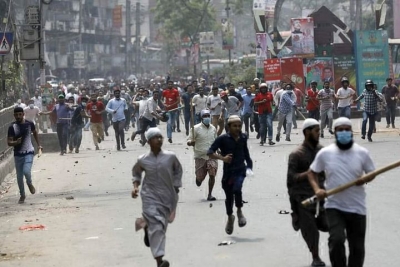South Asia watchers appeared to have arrived at a consensus: A peaceful Bangladesh is a boon for India and the region. After members of Hefazat-e-Islam (HeI) members resorted to violence in Bangladesh last month, Prime Minister of the south Asian nation Sheikh Hasina has cracked down on the the outfit while promising to uphold the principles of inclusivity and culrutal unity.
Her government has continued with unabated efforts to choke the radical outfit.
In a major development, HeI’s Brahmanbaria District Unit Joint Secretary Mufti Abdur Rahim Qasemi resigned as he sought justice over “the mayhem carried out by the Islamist group’s leader and activists in the district,” during Prime Minister Narendra Modi’s visit to the south Asian nation, Dhaka Tribune (DT) reported.
"The loss of life and property of the people cannot be approved by Islam in any way. So, I personally stayed away from all these activities (mayhem) and forced the teachers and students of all the madrasas under my supervision not to take part in those," he said in a statement.
In the last few days, a total of 15 leaders of HeI have been arrested by the Bangladesh authorities.
Not only have intelligence reports shown that HeI members have been actively involved in the violence in Bangladesh which coincided with Prime Minister Narendra Modi’s visit, a few arrested members of the outfit have also confessed.
The Bangladesh based Daily Star, in an article published in its Bengali section, noted that HeI has been attempting to bring down the Hasina government. The outfit also wants to make Bangladesh much like Pakistan and Afghanistan.
Hasina has been cracking down on radical forces
“In the years since, and against the odds, Bangladesh has prospered. And while Pakistan has remained fixated with India, Bangladesh hasn’t manifested similar obsession vis-à-vis Pakistan, despite having borne unspeakable atrocities,” the Spectator –a British weekly magazine—in a report last month said.
However, the report also said the “Bengali identity, forming the basis of Bangladesh as a separate nation, rooted in millennia of Indic pluralism and religious co-existence, continues to be attacked by the perpetrators and collaborators of the 1971 genocide.”
“Weeding out of extremism in the region is absolutely essential for the development of India and the south Asian nations. There have been various radical elements that are working to destabilise development and peace in the region,” Pinak Ranjan Chakravarty, visiting fellow at ORF and a former ambassador told India Narrative.
HeI, as a group also controls most of the madrassas in the country.
“The recent crackdown comes as a boon for India, as extremist elements have the potential to create discord with the country, especially in the eastern and northeastern region. At a time when the geopolitical structure of the region is changing fast, it is key that India keeps a close watch on the developments,” another analyst on condition of anonymity said.
Hasina, in a bid to tackle other extremist groups such as the Jamaat E Islam and others however, has maintained “live and let live” policy with the HeI until recently when it broke onto violence.
According to the European Foundation for South Asian Studies (EFSAS), in the early 1990s, the Harkat-ul Jihad al-Islami Bangladesh (HuJI-B) was established with funds from Al-Qaeda. HuJI-B had strong links with the Pakistan-based Lashkar-e-Taiba (LeT) and at the peak of its operations in 2004, the group claimed that up to 15,000 members had been recruited from Madrassas (Islamic religious schools) in Bangladesh and Pakistan, the EFSAS said.
In the Global Terrorism Index by the Sydney-based Institute for Economics and Peace (IEP), the country ranked 33rd out of a total of 163 countries. Though in 2019, Bangladesh was placed 30th and a year earlier grabbed the 25th position, it appears to have stemmed the tide of Islamic terrorism that was threatening the nation of over 161 million in the first decade of the 21st century.




















